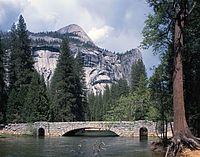Park Service wants to ban most people from Yosemite
July 11, 2013
By Katy Grimes
Yosemite National Park is one of America’s greatest natural treasurers, set aside as a national park nearly 150 years ago by Abraham Lincoln specifically for “the public use, resort and recreation…for all time.”
Yet a proposal by the National Park Service, whose motto is “Experience Your America,” fundamentally changes the entire purpose for which Yosemite was set aside in the first place.
This week I interviewed Rep. Tom McClintock, R-Calif. He said the National Park Service has been pushing to radically alter the purpose, nature and use of Yosemite National Park in order to remove most visitors.
McClintock has been waging a battle against the National Park Service and what it has been doing behind closed doors, with the help of radical environmentalists.
A few months ago, McClintock discovered that the National Parks Service “opposes commercial activities” in the park, and has been working very quietly to get them removed. Bicyling, rafting, camping, snowshoeing and horseback riding were all put on the hit list. It also opposes the souvenir shops, snack stands and hybrid bus tours. These “commercial ventures” apparently offend environmental justice seekers and a new brand of enviro-park rangers who are hostile to park visitors, most of them taxpayers who pay the rangers’ salaries.
According to McClintock, the park service has already begun the process of removing human activity in Yosemite.
The Royal Forest
“Ninety-five percent of the park is already in wilderness,” McClintock explained. “Yet the overwhelming majority of park visitors come to that five percent where amenities are available for public recreation: where they can rent a bike; where they can stop at the snack shop to get ice-cream cones for the kids; where they can pick up souvenirs at the gift shop; where the family can cool off at a lodge swimming pool. And it is precisely these pursuits that the National Park Service would destroy.”
For more than a century, the mission of helping the American people enjoy the grandeur of their national treasure was honored by the park’s stewards. But no more. The new plan would radically alter the visitor-friendly mission of the park with a new, elitist maxim: “Look, but don’t touch; visit, but don’t enjoy.”
The increasingly exclusionary and elitist policies of the National Parks Service and National Forest Service are part of the environmental justice movement. “These actions evince an ideologically driven hostility to the public’s enjoyment of the public’s land — and a clear intention to deny the public the responsible and sustainable use of that land,” McClintock said.
“During the despotic eras of Norman and Plantagenet England, the Crown declared one third of the land area of Southern England to be the Royal Forest, the exclusive preserve of the monarch, his forestry officials and his favored aristocrats,” McClintock explained. “The people of Britain were forbidden access to and enjoyment of these forests under harsh penalties. This exclusionary system became so despised by the people that in 1215, five clauses of the Magna Carta were devoted to redress of grievances that are hauntingly similar to those that are now flooding my office.”
“The National Park Service proposal would remove long-standing tourist facilities from Yosemite Valley, including bicycle and raft rentals, snack facilities, gift shops, horseback riding, the ice-skating rink at Curry Village, the art center, the grocery store, swimming pools, and even the valley’s iconic and historic stone bridges,” McClintock told me. “These facilities date back generations and provide visitors with a wide range of amenities to enhance their stay at — and their enjoyment of — this world-renowned national park.”
The NPS seeks to use the Wild and Scenic River designation of the Merced River as an excuse to expel commercial enterprises and dramatically reduce the recreational amenities available to park visitors. Yet according to the author of the designation, former Rep. Tony Coehlo, D-Calif., this was never the intent of the designation.
The Park Service says the restrictions are necessary to comply with a recent settlement agreement, reached with the most radical and nihilistic fringe of the environmental Left, according to McClintock. But McClintock said the settlement agreement was not mandatory and one in which the Park Service voluntarily entered, then paid $1 million to the environmentalists.
The enviro lawsuit
The changes are part of a new set of principles for the park known as the Merced River Plan. Released only in January, the 2,500-page document comes after years of lawsuits over what should be allowed in Yosemite Valley and the Merced River that flows through it, according to McClintock.
The Merced River Draft Plan public webinars and workshops were held in early 2013, but McClintock said they were essentially a farce.
McClintock said the plan calls for the removal of stone Sugar Pine bridge, built in 1928 and located behind the Ahwahnee Hotel, because its abutments “impede the flow of the Merced River and cause erosion.” It also recommends rebuilding only 40 percent of the 406 campsites lost in the 1997 flood, restoring 203 acres of meadows and improving parking. Visitors still would be allowed to bring bikes, horses or rafts to the park but rentals would not be available any longer.
In fact, that agreement imposes no requirement on the government to do anything more than adopt a plan consistent with current law, according to McClintock. “And current law is explicit: the 1864 act establishing the park guarantees its use for public recreation and resort; the 1916 Organic Act creating national parks explicitly declares their purpose to be the public enjoyment of the public lands, and the Wild and Scenic River Act contemplated no changes to the amenities at Yosemite — so says its author, [former] Democratic Congressman Tony Coelho. Yet the Park Service insists that the law compels these radical changes.”
Flood damage
In January of 1997, the Merced River flooded and caused significant damage to the park. The flood even left more than 2,000 park visitors stranded for several days, because the roads were damaged by the floodwaters.
Following the flood, Congress appropriated $17 million to restore the parking and campgrounds that were wiped out. “That money was spent, but the parking and campgrounds were never restored,” McClintock said. He has made several formal inquiries to the National Park Service asking where the money went. Only just this week he received a report from Yosemite officials. Once he has thoroughly reviewed the report, I will share his findings.
Following the flood and Yosemite’s failure to restore the camp sites or parking, McClintock said the number of annual visitors to the park dropped from 4 million to 3 million, a 25 percent drop. Revenues also dropped about 25 percent.
Protected toads and frogs
Further complicating matters, and providing additional evidence of the radical environmentalist agenda behind the Yosemite proposals, the U.S. Fish and Wildlife Service’s announced it was going to list the Sierra Nevada yellow-legged frog and the mountain yellow-legged frog as endangered species, and the Yosemite toad as a threatened species. And service was going to designate a critical habitat for these species.
“These listings and the associated critical habitat will impact over two million acres of private, state and federal land,” McClintock said. He noted this was exactly why the Fish and Wildlife Service took the action it did. “Critical habitat designations will likely cause severe restrictions on land access and could limit or forbid activities such as grazing, trout stocking, logging, mining, and recreational use, resulting in a devastating impact on the local economy.”
Related Articles
Rent Seeking Coastal Commission
Lloyd Billingsley: California’s Coastal Commission does a fine job of preventing California’s working people from living near the Pacific Ocean but
Legislative transparency bill shelved again
Congresswoman Nancy Pelosi was mocked for saying about the Affordable Care Act, “We have to pass the bill so that
Filner’s fate: The warring conventional wisdoms
There are two conventional wisdoms about Bob Filner, San Diego’s embattled pervert of a mayor, and they can’t both be







